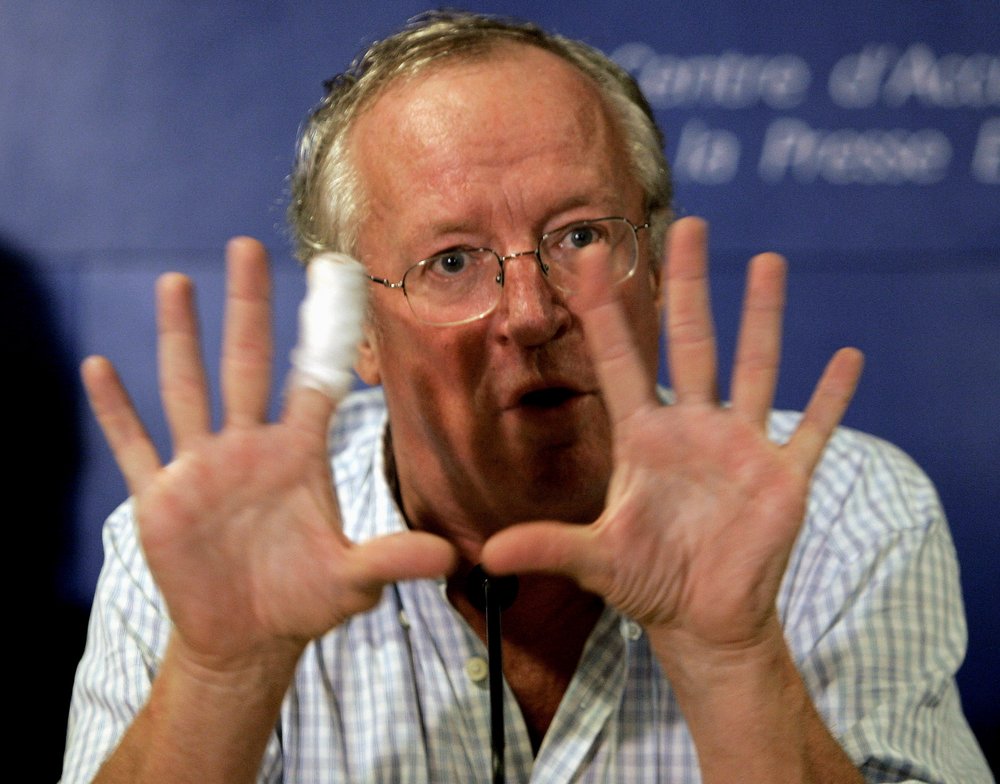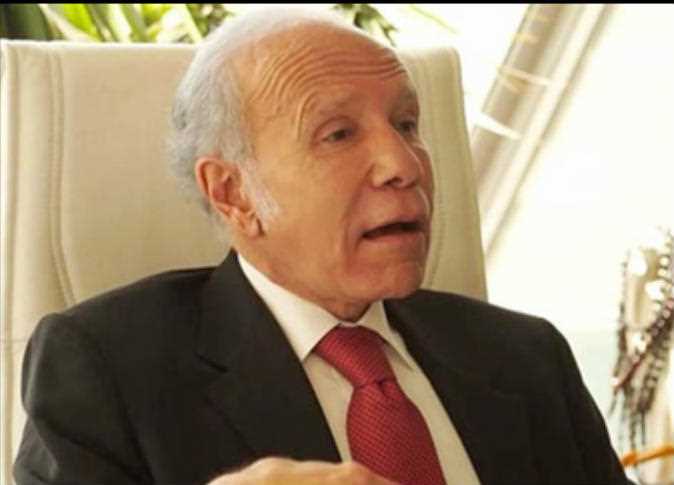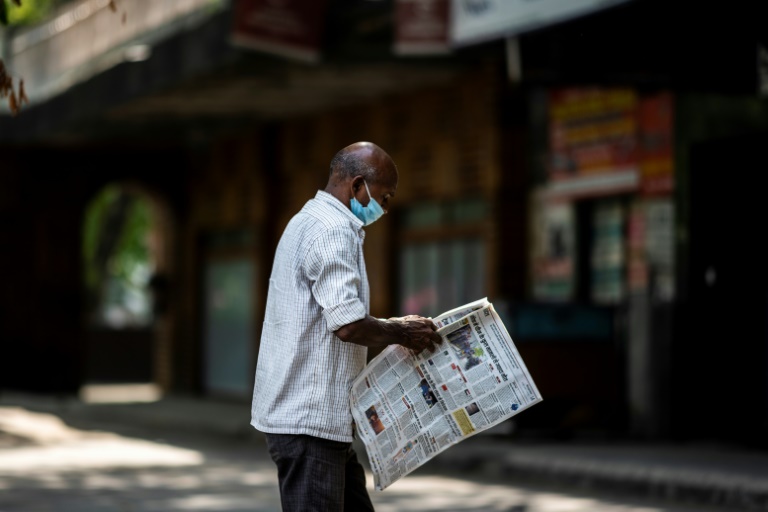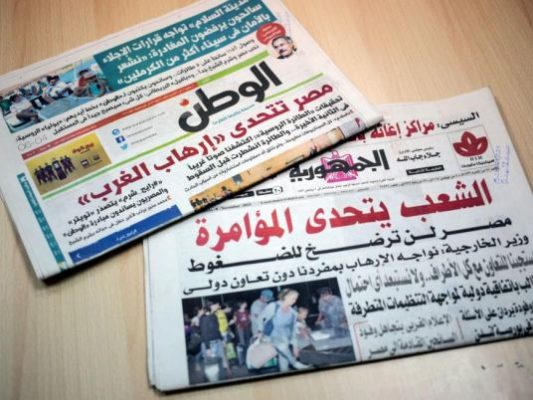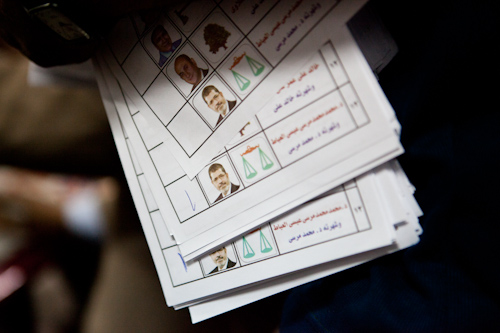
“And the revolution youth have found their leader,” announces Al-Tahrir, the headline appearing over a page-wide image of an open-armed Hamdeen Sabbahi. The Nasserist presidential candidate, who surpassed expectations during the first round of voting by taking major governorates such as Cairo and Alexandria, continues to be touted by the independent daily as the nation’s “preferred” candidate despite preliminary results placing the Muslim Brotherhood’s Mohamed Morsy and former Mubarak crony Ahmed Shafiq in the respective leading positions.
Proposing possible scenarios that would reinstate Sabbahi in the race, Al-Tahrir’s report follows his official complaint regarding the decision to limit the runoff to the aforementioned leading candidates, since, as the paper explains, “the two candidates together only received a combined 49 percent of the votes, which is 1 percent short of the percentage required for the runoffs.” Consequently, Sabbahi has appealed any motion to limit the runoff to two candidates, with the reasoning that, as the second runner-up, he should be allowed to represent the currently lacking percentage.
Sabbahi also submitted official complaints after allegedly “finding a number of ballots that had been thrown among the sugarcane fields in Qena,” in addition to his claim that “117,000 soldiers had been given voting cards, in violation of a law that clearly prohibits members of the police and military institutions from participating in the elections.”
Al-Tahrir also reports that official complaints were lodged by former head of the Arab League Amr Moussa, who placed fifth in the preliminary rounds, as well as Shafiq and moderate Islamist Abdel Moneim Abouel Fotouh.
Meanwhile, the Brotherhood’s Freedom and Justice party paper predictably continues to promote its own candidate while bashing his rival. “How could we vote for he who spilled the blood of our martyrs in vain?” two quotes on the front page ask, while further down, a supposed headline reads, “International media: A win for Shafiq equals a win for Mubarak’s regime,” over a picture of Shafiq with the incriminating caption, “Shafiq.”
A report in the paper also warns of the next two weeks, which would “undoubtedly include numerous attempts by the media at endorsing Shafiq,” before reprinting a list of tweets by public figures condemning the former Mubarak aide. The article then turns into a series of statements championing Morsy, who the paper tries to convince its readers is “the candidate of the Egyptian revolution.”
The FJP paper’s daily Morsy centerfold revolves this time around the candidate’s “five reassuring messages to the Egyptian public,” including a promise to be a “president to all Egyptians, and not just members of the Muslim Brotherhood or the Freedom and Justice Party.” Morsy also pledged to effectively retry “the protester killers, using serious evidence that would indict everyone from gang leader Mubarak to he who wishes to rule the country,” a reference to Shafiq. Morsy’s reassurances also included a promise to encourage open discourse and cooperation with the nation’s varied political forces, as well as one to refrain from reproducing the “Mubarak system.” Morsy then reached out to the nation’s Coptic population with his final reassurance, stating that their rights would be guaranteed, stressing that the Brotherhood had “existed for 80 years without a single issue with our national partners,” because the concept of equality depends entirely on the Muslim Brotherhood’s “reassurances.”
Keeping in line with the theme of reassurances, in Al-Shorouk, Fahmy Howeidy writes of the Israeli government’s “state of reassurance and relief” following the announcement of Shafiq as a leading candidate. “Had it not been for the fact that the Israelis exposed Mubarak when they described him as a strategic treasure for them, we would have continued to live under the delusion that [the former president] was the hero of the infamous airstrike that made him a strategic treasure to the Egyptians.” Howeidy then points out, “for accuracy’s sake,” that Mubarak had by his side his own strategic gem in the shape of Shafiq, who, if president, would come to be held in the same light by the Israelis. Supporting this claim, Howeidy includes a number of recent statements from Israeli media, such as Vice Prime Minister and Minister of Strategic Affairs Moshe Yaa’lon’s claim that “a win for Shafiq would mean the return of the strategic partnership between Egypt and Israel, and the world should work to support him in the runoff elections.” The rest of Howeidy’s piece consists of similar quotes from various Israeli sources.
State-owned Al-Ahram comes with an unlikely attempt at balance, with the front page displaying evenly sized pictures of both candidates under the headline “Morsy and Shafiq intensify their efforts to win the support of political powers.” The paper reports that so far 21 separate parties have called for the dissolution of the Brotherhood and the formation of a “presidential committee consisting of revolutionary leaders and its youth,” in return for granting their support to Morsy. Meanwhile, Abouel Fotouh, who placed fourth in the first round, has requested the Presidential Elections Commission refrain from holding the runoffs until the constitutional court reaches a decision regarding the controversial Political Isolation Law.
The paper also reports that the Salafi-oriented Nour Party has “approached the Brotherhood with the request that they work on a strategy of national agreement,” and reach out to all walks of society “in the interest of protecting the revolution.” Morsy campaign manager Yasser Ali responded by stating that a conference with the varied groups would be scheduled immediately, before pointing out that popular candidates Abouel Fotouh and Sabbahi had already “on principle” rejected offered positions of vice president.
The paper also reports that the preliminary election results have caused much tension in the ranks of the Wafd Party, with 51 members resigning over what they perceive to be a “betrayal to independent candidate Amr Moussa.”
Al-Ahram also includes a quote from Presidential Elections Commission official Amr Salama denying any truth to reports that 900,000 soldiers had been allowed to vote in the first round of the election.
Egypt’s papers:
Al-Ahram: Daily, state-run, largest distribution in Egypt
Al-Akhbar: Daily, state-run, second to Al-Ahram in institutional size
Al-Gomhurriya: Daily, state-run
Rose al-Youssef: Daily, state-run
Al-Dostour: Daily, privately owned
Al-Shorouk: Daily, privately owned
Al-Watan: Daily, privately owned
Al-Wafd: Daily, published by the liberal Wafd Party
Youm7: Daily, privately owned
Al-Tahrir: Daily, privately owned
Freedom and Justice: Daily, published by the Muslim Brotherhood’s Freedom and Justice Party
Sawt al-Umma: Weekly, privately owned
Al-Arabi: Weekly, published by the Nasserist Party
Al-Nour: Official paper of the Salafi Nour Party

